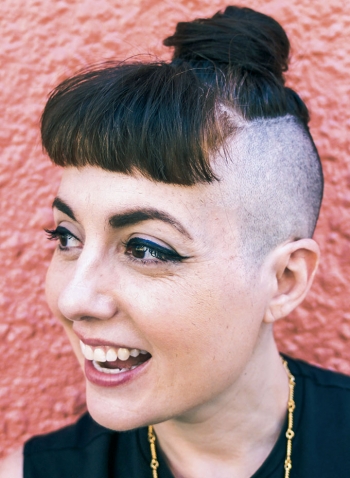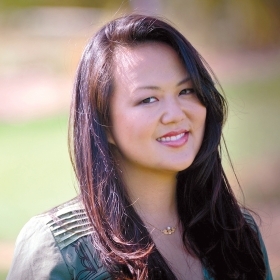Artist and filmmaker Danielle Durchslag ’03 was born into what she describes as a “Jewish dynasty.” A Chicago native, she is the daughter of a rabbi and great-granddaughter of Nathan Cummings, the son of Jewish Lithuanian immigrants who went on to start the Sara Lee Corporation and became a major philanthropist and art collector. Though Cummings died when Danielle was young, he was a constant presence in her life. Her family, she explains, had a “hero’s narrative about him and how our family had changed over the course of his lifetime.” Now, she explores the psychological and political complexities of the world of Jewish American wealth she grew up in through her experimental films.
At Wellesley, Danielle’s studies planted the seed for a filmmaking future. “I got to look at cinema with all these incredible minds around me, with deep, thoughtful analysis of race, class, and gender,” she says. She created her own film studies major, which continues to inform her artistic process.
After graduation, Danielle did not immediately jump into film. She moved to New York, where she received an M.A. in art education from NYU and worked for most of her 20s as a visual artist. She taught at the Jewish Museum and the Museum of the Moving Image and showed her work at galleries throughout the city. As her body of work grew, so did her desire to be a filmmaker, and she studied filmmaking at the School of Visual Arts. It was her 2015 project A Wandering Sukkah, a collaboration with artist Ryan Frank, that sparked the idea to marry filmmaking with her own roots and history. Their sukkah, based on the traditional hut used to celebrate the Jewish holiday of Sukkot, was a structure whose design echoed the architecture of New York City. It was created for all New Yorkers to enjoy, regardless of religion, and it traveled to all five boroughs to vastly diverse communities during the week of the holiday. This project, says Danielle, reconnected her to her Jewish identity, one she describes as “thick and complicated, not exclusively easy, a relentless part of who I am.”
Through film, Danielle seeks to “expose the psychological contours of American families like mine, immigrant dynasties who came into their wealth when high class was synonymous with WASPs.” Her 2019 experimental film Eleanor of Illinois features actress Judy Kuhn performing an edited monologue of Katharine Hepburn taken from the 1968 film A Lion in Winter, a childhood favorite of Danielle’s. The original film is a period piece about Henry II jockeying for the throne over the holidays. Danielle has a very personal connection to it, describing it as the story of “an uphappy, extremely connected, wealthy family at a holiday meal, playing out dysfunction … that’s my childhood.” Danielle spent a year editing footage of Hepburn in the film, recontextualizing her words to create the monologue of a “disappointed, contemporary, Midwestern Jewish mother at Passover.” While Kuhn acts out the dialogue, the audio switches between her voice and Hepburn’s, which Danielle considers the ultimate WASP voice. The film received a grant from the inaugural cycle of the NYC for the Arts’ Made In NYC Women’s Fund for Film, TV, and Theatre.
Danielle again culls from her personal experience in her new series of video collages, BOUNTY, in which she has again taken footage from films about wealthy WASPs and re-envisioned them in a Jewish context, editing the dialogue and adding the occasional religious ornament or icon. The resulting short films are smart, funny, simultaneously serious and campy observations on how Protestant and capitalist dynamics influenced families like hers. “My belief,” she explains, “is that American Jewish wealth, especially for families like mine who came to it in the ’40s and ’50s, reads as a sophisticated WASP drag. Like drag, it can be playful, but it also embodies the elements of a thing to such an extreme that it almost subverts itself.”







We ask that those who engage in Wellesley magazine's online community act with honesty, integrity, and respect. (Remember the honor code, alums?) We reserve the right to remove comments by impersonators or comments that are not civil and relevant to the subject at hand. By posting here, you are permitting Wellesley magazine to edit and republish your comment in all media. Please remember that all posts are public.